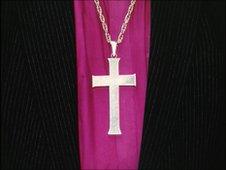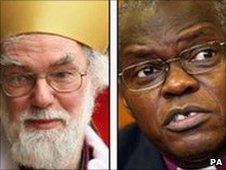Women bishops should be allowed, General Synod rules
- Published

There had been opposition to the creation of women bishops
The Church of England's ruling body has decided that women bishops should be allowed, but there are further steps to take before they can be ordained.
The General Synod has given minimal concessions to traditionalist Anglicans who opposed the move.
They had sought to be in the care of a male alternative bishop on terms acceptable to them.
But the synod decided women bishops should be able to decide the identity and functions of any such bishop.
The BBC's religious affairs correspondent Robert Pigott said women bishops would have only to consult a code of practice guiding them in their dealings with traditionalists.
He said the decision made during a synod meeting at York University had left a lot of division in its wake.
Draft law
Members of the synod decided there was no need for further delay to the progress of a draft law allowing women to be made bishops.
The law must now receive approval from a majority of the Church's 44 diocesan synods, before returning to the General Synod.
It must then receive a two-thirds majority at the General Synod before receiving parliamentary approval and the Royal Assent.
Our correspondent said it had been an "extraordinary weekend of intense emotion" and although supporters were celebrating a breakthrough, some traditionalists had left the synod chamber in tears.

The Archbishops of Canterbury and York backed a failed compromise plan
Proposals to create a class of male-only bishops to oversee traditionalist parishes were rejected on Saturday.
The Archbishop of Canterbury, Rowan Williams, and Archbishop of York, John Sentamu, had put their personal prestige behind the compromise plan, which would have allowed parishes unwilling to serve under a woman bishop to call upon the oversight of a male alternative.
It would also have given that alternative bishop considerable legally-backed independence and autonomy as part of a "joint jurisdiction" over those parishes.
Although the proposal gained a majority of votes in the synod as a whole, it failed because clergy - who vote separately from lay people and bishops - defeated it by just five votes.
Our correspondent said Dr Williams had put his reputation on the line with the compromise plan and would now be in a difficult position as he tried to deal with discontent traditionalists who would probably stay in the church.
The proposals will now go out to dioceses and return to the synod in a year's time when there will be a final vote.
'Hard decisions'
Campaigner Christina Rees, a member of the General Synod and chairwoman of Women in the Church, told the Press Association the synod's decision on Monday was "a wonderful outcome".
She said: "This is wonderful news. It is entirely consistent with what synod indicated it wanted two years ago.
"In one sense I am not surprised but I am delighted, it is very, very good news."
But traditionalists have warned that the decision could result in many of them leaving the Church of England.
The Reverend Prebendary David Houlding, a leading member of the Catholic Group on the General Synod, said he was concerned and he felt as if traditionalists were running out of options.
He told PA: "There are several people who will be making hard decisions about their future.
"I am staying in the Church of England for the time being until I am driven out. I am not going willingly, I will only go if forced.
"The more this goes on in this manner, the more it seems as if the door is shutting.
"The scope for remaining in the Church of England is getting more and more narrow and the options are rapidly closing."